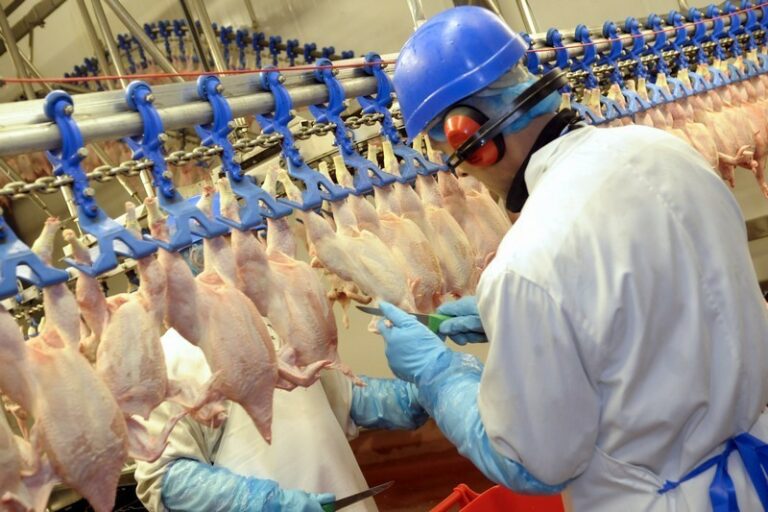Parliamentary select committee hearings bear more than a passing resemblance to a courtroom trial, and so it was that Ranjit Boparan found himself in the dock on 25 October.
The notoriously private man, who doesn’t give interviews and isn’t required to answer to shareholders on account of his business also being private, was compelled to attend Defra’s grilling lead by Neil Parish MP over hygiene failings at his West Bromwich chicken processing plant.
It was clearly an uncomfortable experience for Boparan, who founded the sprawling business empire that includes 2 Sisters Food Group, Fox’s biscuits, Goodfella’s pizza, and the recently-snapped-up Bernard Matthews. His factories supply one third of all the chicken eaten in the UK and he has accumulated personal wealth estimated at more than half a billion pounds.
At times during the questioning he struggled to stay calm. With a raised voice at one point he said: “We do not have poor standards. I invite all of you to my factory.”
Footage, filmed covertly by reporters from The Guardian and ITV during the summer, showed a worker throwing chickens back on the production line after they’d fallen on the floor. Other parts of the film showed workers repackaging chickens with Tesco labels with new Lidl packaging and potentially more seriously – altering the kill dates.
Boparan apologised and said he would fund the cost of independent inspectors to police all 12 of his UK chicken processing plants. “I am sorry,” he said, to “this committee, consumers, our customers and colleagues” and promised to “go see any retailer to ask them to take product from that factory,” to try and restore confidence.
Parish was polite but sceptical. “What he said today was recorded and is on the record. I accept his word that he will improve and put things right. But God help him if he’s got to come here again and he hasn’t put it right.”
Immediately after the story came out in September, the plant was closed for ‘staff retraining’. This lasted four weeks at a cost of £500,000 per week in lost sales and other costs. £2 million down the drain straight away.
The reputational damage is harder to estimate, and there is sympathy for 2 Sisters among competitor firms.
“It should never have happened,” says a senior poultry industry leader. “But they were clearly unlucky. Another day, another week, there would have been nothing to see. Breaches can happen, but it’s not routine.”
“It could have been any of us,” says a director of a rival poultry integrator. “Yes, we have strict standards, but ultimately we have a lot of staff who speak a lot of languages it can happen that they choose to ignore rules. You can’t always stop someone who goes rogue however hard we try.”
Condemnation from retailers was immediate. Tesco, Lidl, M&S and Aldi and Sainsbury’s all withdrew custom. All have since returned apart from Sainsbury’s.
But financially, there’s not a lot of slack in the system. Margins are already strained thanks to Brexit-related inflation driving up input costs. In its fourth quarter results, published in November, Borparan Holdings declared an operating profit of £14.8 million on like-for-like sales of £802.2 million.
“The business continues to face into an extremely tough trading environment with further increases in input costs,” said Boparan in notes accompanying the results. “Clearly margin performance improvement is a top priority, and this will be underpinned by working hard on the action plans that make the most difference to our core business. Nevertheless, we remain positive about our top line growth and how that positions us with our customers.”
Moody’s Investors Service in November downgraded Boparan Holdings due to thin margins and ‘limited prospects’ of material recovery in the coming 12 months.
“The downgrade of Boparan’s ratings to B3 with a negative outlook is driven by the lower EBITDA in the last fiscal year 2016-17 as well as limited prospects of a material recovery in the next 12 months, which would result in a sustained high financial leverage, thin margins and weak to slightly negative free cash flow generation,” said Eric Kang, a Moody’s analyst.
Moody’s expects measures to strengthen quality control following the recent hygiene failings allegations will also further pressure already thin margins.
More recently, MPs published a report denouncing the food regulator, the Food Standards Agency (FSA) for slack enforcement of the law.
The report claimed the infractions filmed by the reporters were “not a one-off”. MPs said they were “concerned at the apparent laxity of the oversight”.
“For an industry which takes pride in the quality of its produce, we were surprised to hear of the apparently patchwork nature of the accreditation process,” the MPs said.
“It appears relatively simple for someone to game the system and hide infractions – by opting out of unannounced visits by the accreditors for example – and the lack of joined-up intelligence and knowledge-sharing seemingly presents many gaps into which misdemeanours can fall.
“We trust that all accreditation firms, not just those who appeared before us, will use this incident as a wake-up call to tighten their processes and remove some of the more obvious loopholes.”
This should worry everyone in the industry concerned with red tape. The FSA has since said it is still investigating the allegations made by ITV and the Guardian “and will publish our findings when the work is completed.” The FSA will also soon make a “formal response” to allegations it has failed to properly enforce the law.
In the intervening period, Michael Gove, Defra’s secretary of state, has pushed forward with plans to make CCTV mandatory in all abattoirs in England from 2018, a move that has been welcomed by businesses and welfare organisations alike. But the details are not yet known, nor are the costs.
For Boparan, the public grilling may be over, but until the final reports come out, the case is not closed and everyone in the industry will have to be more vigilant than ever.


